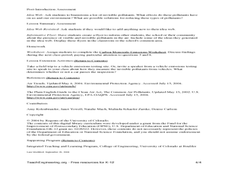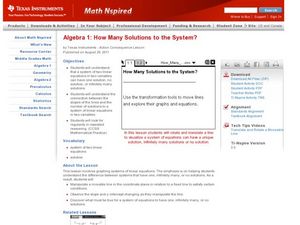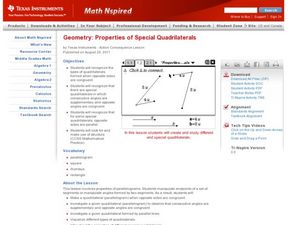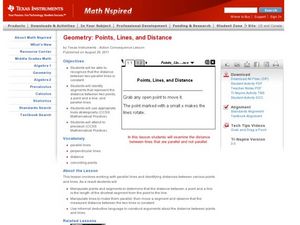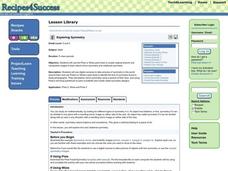Curated OER
I Don't Believe My Eyes!
Students develop their understanding of the effects of invisible air pollutants. For this invisible air lesson, students complete experiments with a rubber band air test, a bean plant experiment and by exploring engineering roles related...
Curated OER
Creating AB Patterns
Students work with patterns. In this pattern lesson, students find AB patterns in nature and the manmade world. They create their own AB pattern using math manipulatives and visual arts.
Curated OER
The Ins And Outs Of Area And Perimeter
Fifth graders demonstrate the concept of perimeter and area using manipulative. In this area and perimeter lesson, 5th graders explore area and perimeter through the exploration style of teaching using eatable and non-eatable...
Curated OER
Number and Operations- Raul's Apples: Word Problem
Students discover how they can use manipulatives to solve word problems. For this problem solving lesson, students read Raul's Apples Problem and then complete a worksheet, using beans or counters to solve the problem. Students discuss...
Curated OER
Terrific Tangrams
Third graders construct tangrams. In this tangrams lesson, 3rd graders manipulate basic shapes to construct tangrams. Students explore how shapes can be combined in different ways and develop spatial sense.
Curated OER
Quick Stats with Quick Poll
Learners analyze data using bar graphs and the TI in this statistics instructional activity. They investigate quick polls and graph the data using different properties of statistics. This assignment requires a TI Navigator.
Curated OER
Angles and Arcs
Students identify the relationship between angles and arcs. For this geometry lesson, students rotate and move the circle around to create different arcs on the TI-Navigator. They differentiate between major and minor arcs.
Curated OER
Exploring Tessellations
Fifth graders examine how to make tessellations. For this tessellation lesson, 5th graders review the meaning of the word "polygon" while the teacher shows them various examples. They practice making tiling patterns or tessellation's...
Curated OER
Junk Sort
Students analyze objects by one or more attributes. In this sorting lesson, students use manipulatives and string or yarn to create a sorting game. Students read books and items from the classroom to sort.
Curated OER
How Many Solutions to the System?
Solve systems of equation using graphing! In this algebra activity, learners use the TI to graph two lines and identify the number of solutions. They perform interactive graphing on the navigator.
Curated OER
Corresponding Parts of Similar Triangles
Here is a lesson that has learners take a look at corresponding parts of similar triangles, ratios of similarity, reductions and enlargements. They'll manipulate the scale factor (r) to observe the changes in similar triangles and then...
Curated OER
Properties of Special Quadrilaterals
Teach your mathematicians how to identify the properties of quadrilaterals. In this geometry lesson, high schoolers solve for missing angles and sides of a special quadrilateral. They use the TI to move the sides around and create...
Curated OER
Parabolic Paths
Learners investigate properties of parabolas. In this algebra lesson plan, students identify the different paths of a parabola. They use the navigator to make observations of the parabola.
Curated OER
Balancing Equations
Students balance equations using the correct method. In this algebra lesson, students solve linear equations using a virtual balance beam as a manipulative. They play games to reinforce the concept of equations being and staying balanced.
Curated OER
Points, Lines, and Distance
Students calculate the distance between two points. In this geometry lesson, students define the meaning of the distance between parallel lines. They find the point of intersection of other lines.
Curated OER
How Many Solutions 2
Students solve systems of equations. In this algebra activity, students graph lines and identify the point of intersection. They identify the function to see if it is a function.
Curated OER
Meet the Neighbors: Planets Around Nearby Stars
Learners explain why a transiting planet causes a periodic dimming in the light from its parent star. They determine the radius of a planet, and its orbital distance, by analyzing data and manipulating equations. Students compare the...
Curated OER
Multiplication: Determining the Weight of Multiple Objects
Seventh graders use their knowledge of multiplication and problem solving to determine the total weight of multiple objects. In this multiplication lesson, 7th graders weigh various manipulatives, record the weight, and use...
Curated OER
QUILTING AND COMBINATIONS
Young scholars apply problem solving procedures and skills to solve a given real life problem by manipulating felt squares to represent the possible combinations for a two color quilt.
Curated OER
Quadrilaterals: Four-sided Figures
Fifth graders engage in a variety of hands-on and technology-rich activities involving the classification of quadrilaterals. They utilize protractors and rulers to investigate the characteristics of various types of quadrilaterals. They...
Curated OER
Ranging the Triple M's
Fifth graders explore collecting and analyzing data. In this mean, median and mode lesson, 5th graders use real word data to determine the mean, median and mode. Students are given sets of numbers on index cards as asked to find the...
Curated OER
Exploring Symmetry
Young scholars use a software program to create artwork and to manipulate images to study mirror and rotational symmetry. They take pictures of items in their environment in which they identify symmetry.
Curated OER
Fractions!
Second graders observe and design manipulatives showing fractional parts. In this fractional part activity, 2nd graders create a paper hamburger using circle fractions. Students navigate a website to find fractional parts of a hexagon.
Curated OER
The Game of Chance
Third graders use manipulatives to determine the probability of outcomes. In this probability lesson, 3rd graders roll dice and use spinners to determine the probability of outcomes. They determine if games are fair/unfair based on their...


